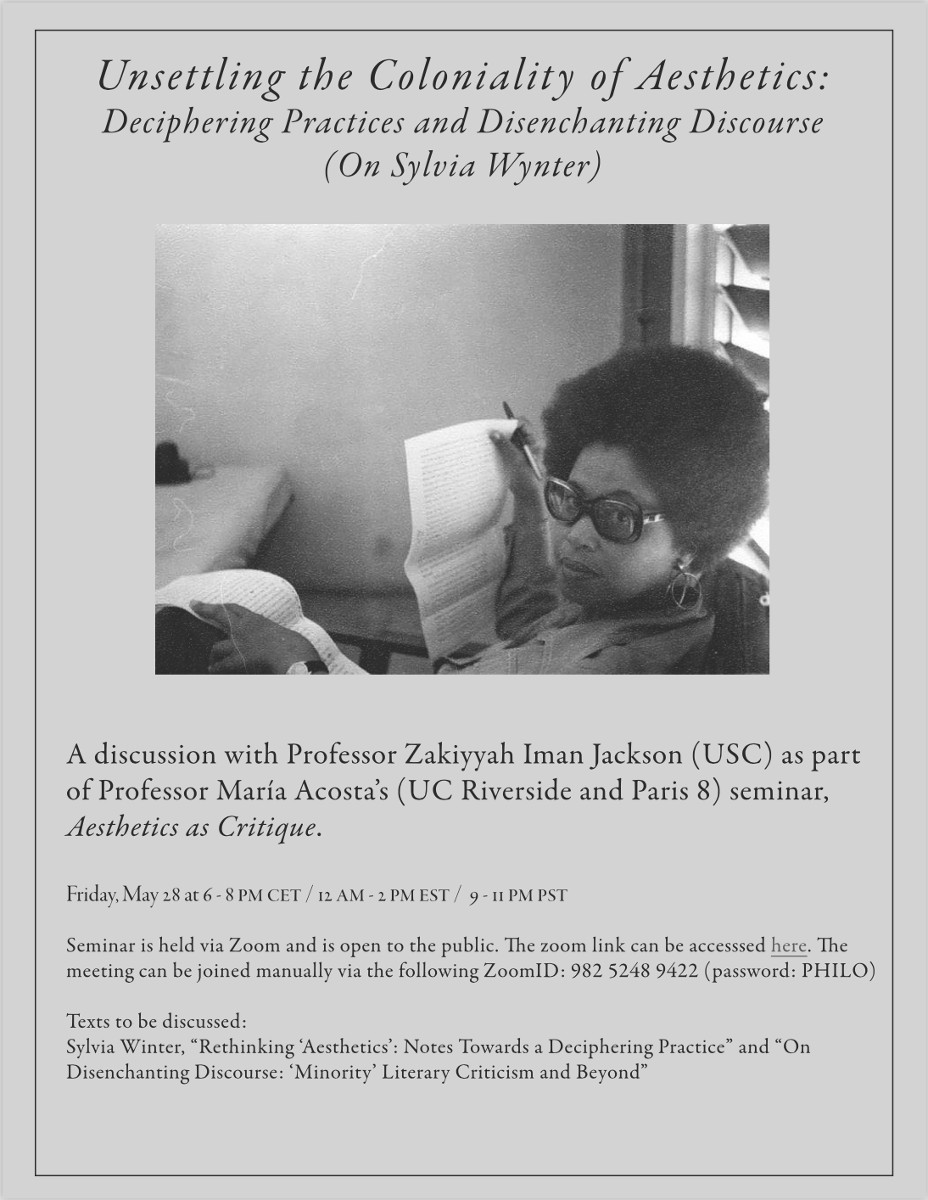Chaire internationale de philosophie contemporaine de l’Université Paris 8. María del Rosario Acosta López (Université de Californie à Riverside) : Aesthetics as Critique : From the Critique of Aesthetics to a Decolonial Perspective. 2.04-4.06.2021
Chaire internationale de philosophie contemporaine de l’Université Paris 8
Séminaire 2020-2021 (en anglais)
María DEL ROSARIO ACOSTA LÓPEZ
PR, Département d’études hispaniques, Université de Californie à Riverside
Aesthetics as Critique :
From the Critique of Aesthetics to a Decolonial Perspective
Vendredis 18h00-20h00. 8 séances : 2 Avril - 4 Juin 2021 (pause les 30 Avril et 7 Mai)

Visioconférence des séances
https://zoom.us/j/98252489422?pwd=MnIrbVJmTGJabWVldGR0NnpVVUdwQT09
ID de réunion : 982 5248 9422 | Mot de passe : PHILO
Site Internet du séminaire
https://grammarsoflistening.wordpress.com/aesthetics-as-critique-2
Visite de la Professeure Zakiyyah Iman Jackson (Université de Californie du Sud), lors de la 7ème séance le 28 mai 2021 | Flyer (PDF)
Visite du Professeur Omar Rivera (Université de Californie du Sud), lors de la 8ème séance le 4 juin 2021
This course departs from a broad conception of aesthetics as the realm in which, through our senses, perceptions and desires, sense is (re)framed, (re)distributed, and either made intelligible or rendered imperceptible (invisible, inaudible, untouchable). That is, aesthetics is understood as always already political and, if taken up critically, as a political task. The seminar will begin by focusing on some of the philosophical foundations of aesthetics at the end of 18th century in Germany and the important turn, at the beginning of the 19th century, from aesthetics to philosophy of art. Special attention will be paid to F. Schiller as a thinker who, starting from Kant’s critique of aesthetics, will move towards a conception of aesthetics as critique. As we will see, such a conception will prove influential for G.W.F. Hegel’s approach to the philosophical and historical role of art, as well as for later aesthetical-political approaches to critique (and the critical potential of art) such as those of the Frankfurt School in the first half of 20th century. Examining some of these more contemporary approaches (with particular attention to W. Benjamin and H. Marcuse), we will then turn to their interpellations, critiques and creative appropriations by Latin American and Caribbean thinkers, in order to explore the possible (dis)connections between aesthetics understood as a historical-political critical task and a decolonial perspective. The reading list for this section will include readings by Eduard Glissant, Sylvia Wynter, Nelly Richard and Silvia Rivera Cusicanqui, accompanied by concrete examples of Latin American artistic and cultural interventions.
For updates on the seminar sessions, announcements, and discussion forums after the seminar, refer to https://grammarsoflistening.wordpress.com/aesthetics-as-critique-2.
All the readings will be uploaded online in a google drive. To access the drive and subscribe to the seminar’s email list please send your name, institutional affiliation (if any) and short description of your interests to acostaparisviiiseminars@gmail.com.
Ce cours s’écarte d’une conception large de l’esthétique comme étant le domaine dans lequel, à travers nos sens, nos perceptions et nos désirs, le sens est (re)cadré, (re)distribué, et rendu intelligible ou imperceptible (invisible, inaudible, intouchable). Autrement dit, l’esthétique est comprise comme étant toujours déjà politique et, si elle est comprise de manière critique, comme une tâche politique. Le séminaire commencera par se concentrer sur certains des fondements philosophiques de l’esthétique à la fin du XVIIIe siècle en Allemagne et sur le tournant important, au début du XIXe siècle, de l’esthétique vers la philosophie de l’art. Une attention particulière sera accordée à F. Schiller en tant que penseur qui, à partir de la critique de l’esthétique de Kant, s’orientera vers une conception de l’esthétique comme critique. Comme nous le verrons, cette conception aura une influence sur l’approche de G.W.F. Hegel concernant le rôle philosophique et historique de l’art, ainsi que sur les approches esthético-politiques ultérieures de la critique (et du potentiel critique de l’art), comme celles de l’école de Francfort dans la première moitié du XXe siècle. En examinant certaines de ces approches plus contemporaines (avec une attention particulière pour W. Benjamin et H. Marcuse), nous nous tournerons ensuite vers leurs interpellations, critiques et appropriations créatives par les penseurs d’Amérique latine et des Caraïbes, afin d’explorer les (dé)connexions possibles entre l’esthétique comprise comme une tâche critique historico-politique et une perspective décoloniale. La liste de lecture de cette section comprendra des lectures d’Édouard Glissant, Sylvia Wynter, Nelly Richard et Silvia Rivera Cusicanqui, accompagnées d’exemples concrets d’interventions artistiques et culturelles latino-américaines.
Pour les mises à jour des sessions du séminaire, les annonces et les forums de discussion après le séminaire, consultez le site https://grammarsoflistening.wordpress.com/aesthetics-as-critique-2.
Toutes les lectures seront téléchargées en ligne sur un google drive. Pour y accéder et vous inscrire à la liste de diffusion du séminaire, veuillez envoyer votre nom, votre affiliation institutionnelle (le cas échéant) et une brève description de vos intérêts à acostaparisviiiseminars@gmail.com.
Séances/Lectures :
Session 1 (April 2) : From Aesthetics as Critique to Decolonial Aesthetics (general introduction)
Session 2 (April 9) : The Resistance of the Beautiful
Main readings : Kant, I. Critique of the Power of Judgment, tr. Paul Guyer (Cambridge : Cambridge U.P, 2000) “Analytic of the beautiful,” special attention will be given to §1-5, §10-14 and §18-19 ; and Schiller, F. “Kallias or Concerning Beauty : Letters to Körner”, in Classic and Romantics German Aesthetics, ed. Jay M. Bernstein (Cambridge : Cambridge University Press, 2003) : 145-184.
Session 3 (April 16) : Beauty as Suspension : the Time of the Beautiful
Main readings : Kant, I. Critique ofthe Power of Judgment, tr. Paul Guyer (Cambridge : Cambridge U.P, 2000) “Analytic ofthe beautiful,” special attention will be given to §9 ; Schiller, F. “Letters on the Aesthetic Education of Humankind,” in Essays, ed. Walter Hinderer and Daniel Dahlstrom (New York : Continuum, 2001) : 86-178. Recommended : Marcuse, H. “The Aesthetic Dimension” in Eros and Civilization : a Philosophical Inquiry into Freud (Boston : Beacon Press, 1955) : 172-196
Session 4 (April 23) : Towards Art as a Historico-Critical Standpoint
Main readings : Hegel, G.W.F., Lectures on Fine Art, tr. T.M. Knox (Oxford : Clarendon Press, 1925), Introduction (1-81) and the “Dissolution of the Romantic Form of Art” (595-611). Recommended : Benjamin, W. “Critique of Violence” (SW1, 236- 252) and “The Work of Art in the Age of Its Technological Reproductibility” (Third Version) (SW 4, 251- 270).
Session 5 (May 14) : “Protesting Everything that Beauty is Not” Special guest : Miguel Gualdrón Ramírez (University of North Texas).
Main readings : Glissant, È. “In Praise of the Different and of Difference,” Callaloo 36.4 (2013) 856–862 ; Glissant, È. and Chamoiseau, P. “When the Walls Fall,” Contemporary French and Francophone Studies 22:2 (2018) 259-270. Recommended : Glissant, È. Treatise on the Whole-World (Liverpool University Press, 2020) (selections TBA).
Session 6 (May 21) : Deciphering Aesthetics and Disenchanting Discourse — Session postponed.
Main readings : Wynter, S. “Rethinking ‘Aesthetics’ : Notes towards a Deciphering Practice,” in Ex-iles : essays on Caribbean Cinema (Trenton : Africa World Press, 1992), 237-280 ; Wynter, S. “On Disenchanting Discourse : ‘Minority’ Literary Criticism and beyond,” Cultural Critique Fall : 7 (1987) 207-244. Recommended : “Fleshing Out the Image #2 : Zakiyyah Iman Jackson in conversation with Denise Ferreira da Silva” (https://vimeo.com/484448662)
Session 7 (May 28) : Aesthetics of the Fragmentary and Damaged Scripts
With the presence and intervention of Professor Zakiyyah Iman Jackson (University of Southern California)
Recommended video : https://www.youtube.com/watch?app=desktop&v=N0-wMvYNDyo
Main readings : Texts previously planed on session 6.
Richard, N. “Ruptures, Memory and Discontinuities” in The Insubordination of Signs : Political Change, Cultural Transformation, and Poetics of the Crisis, Duke University Press, 2004, 1-21 ; Acosta, M.R. “Memory and Fragility : Art’s Resistance to Oblivion (three Colombian cases),” New Centennial Review 14:1 (2014) 71-98. Recommended : Benjamin, W. “The Storyteller”, Illuminations : Essays and Reflections (NY : Schocken, 1969) : 83- 110.
Session 8 (June 4) : Cacophonies of Memory and Textures of the Now
With the presence and intervention of Professor Omar Rivera (University of Southern California).
Main readings : Rivera Cusicanqui, S. “Palabras mágicas : reflexiones sobre la crisis presente” y “Oralidad, mirada y memoria del cuerpo en los Andes”, Un mundo ch’ixi es posible (Buenos Aires : Tinta limón, 2018) 93-134. (No translation available, we’ll read in English “Sociology of the Image : A View from Colonial Andean History” in Ch’ixinakax utxiwa : On Decolonising Practices and Discourses, tr. Molly Geidel (Cambridge : Polity, 2020) : 12-45.) Recommended : De la Cadena, M. “The Eventfulness of the Ahistorical,” Earth Beings : Ecologies of Practice Across Andean Worlds (Duke, 2015) 117-152 ; Rivera, O. “Resistant Epistemologies from the Andes (A Contribution to Latin American Philosophy),” Journal of World Philosophies 5 (2020) 76-88 ; Vallega, A. “Latin America’s Living Anachronic Temporalities,” in Latin American Philosophy from Identity to Radical Exteriority (Bloomington : Indiana University Press, 2014) 99-119.
Lectures principales (toutes seront fournies en PDF) / Main readings (all will be provided in PDF) :
Kant, I. Critique of the Power of Judgment, tr. Paul Guyer (Cambridge : Cambridge U.P, 2000) (selection, special attention will be paid to §9).
Schiller, F. “Kallias or Concerning Beauty : Letters to Körner”, in Classic and Romantics German Aesthetics, ed. Jay M. Bernstein (Cambridge : Cambridge University Press, 2003) : 145-184 and “Letters on the Aesthetic Education of Humankind,” in Essays, ed. Walter Hinderer and Daniel Dahlstrom (New York : Continuum, 2001) : 86-178.
Hegel, G.W.F., Lectures on Fine Art, tr. T.M. Knox (Oxford : Claredon Press, 1925), Introduction.
Benjamin, W. “Critique of Violence” (SW1, 236-252) and “The Work of Art in the Age of Its Technological Reproductibility” (Third Version) (SW 4, 251-270).
Marcuse, H. “The Aesthetic Dimension” in Eros and Civilization : a Philosophical Inquiry into Freud (Boston : Beacon Press, 1955) : 172-196.
Glissant, E. Poetics of Relation (Ann Arbor : University of Michigan Press, 1997) and Caribbean Discourse : Selected Essays (Charlottesville : University of Virginia Press, 1999) (selection).
Wynter, S. “Rethinking ‘Aesthetics’ : Notes towards a Deciphering Practice,” in Ex-hiles : essays on Caribbean Cinema (Trenton : Africa World Press, 1992), 237-280.
Richard, N. “Ruptures, Memory and Discontinuities” in The Insubordination of Signs : Political Change, Cultural Transformation, and Poetics of the Crisis, Duke University Press, 2004, 1-21.
Rivera Cusicanqui, S. “Palabras mágicas : reflexiones sobre la crisis presente” y “Oralidad, mirada y memoria del cuerpo en los Andes”, Un mundo ch’ixi es posible (Buenos Aires : Tinta limón, 2018) 93-134. (No translation available, we’ll read in English “Sociology of the Image : A View from Colonial Andean History” in Ch’ixinakax utxiwa : On Decolonising Practices and Discourses, tr. Molly Geidel (Cambridge : Polity, 2020) : 12-45.





